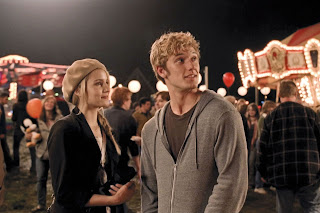 (3 stars for kids).
(3 stars for kids).I confess that I did not know this was originally a young adult novel when going to see the movie. I expected a kind of pop sci-fi a la Fantastic Four (maybe I was confused on the Four, or the young blond stars). If I had known, I might not have expected as much from this movie or been quite as disappointed.
The young kids in the movie - many boys between ages six and twelve - seemed most impressed, however, and clearly, this is a film meant for them.
John Smith (played with steady, sincere blankness by pretty boy and model Alex Pettyfer) is the blond alien in question. A refuge from the planet Lorien (which is perhaps also known as the planet Banana Republic, judging from the costuming of the movie), he is one of nine teenagers hiding out on earth with special powers. He's accompanied by a guardian and father-figure, Henri (Timothy Olyphant, with touches of gray). I must say, remembering Olyphant as the young, sexy lout from Go (1999), it's hard to imagine him old enough to play the father of the 21-year-old Pettyfer, but there you go...time marches on.
 |
| Olyphant in 1999 |
Henri and John are hiding out from the evil Magadorians, who seem like intergalactic Rugby players with a kind of annoying (but meant to be endearing) Scream-3 habit of self-narrating their own evil shenanigans. Rather than get into any complicated sci-fi details (it all feels a bit rather like the back story of Superman Two), the movie would rather go the route of teen romance, and with inspiration and borrowing from great literature such as Twilight, "Smallville," Harry Potter, and "Glee," and so boldly goes into the realm of high-school jocks, nerds, and small-town Ohio, with sets that feel as dressed up as a Paramount back lot on October 31st (even the flowers planted in front of the houses look artificial).
 John, like the other refuge Lorians, has some special powers (called "legacies" - don't ask me why they aren't simply called special powers). His is that his hands glow like flashlights. Useful I suppose if you don't have your iPhone handy. He's the next Lorian on the Magadorian's hit list, so he decides to lay low by posing as a high school student, where he promptly starts picking fights with the jocks and falling in love with the top jock's ex sweetheart, a girl named Sarah Hart. He also comes to the defense of the local nerd, Sam Good, whose father was abducted by aliens (though not Lorians - probably those bumbling Magadorians up to their tricks).
John, like the other refuge Lorians, has some special powers (called "legacies" - don't ask me why they aren't simply called special powers). His is that his hands glow like flashlights. Useful I suppose if you don't have your iPhone handy. He's the next Lorian on the Magadorian's hit list, so he decides to lay low by posing as a high school student, where he promptly starts picking fights with the jocks and falling in love with the top jock's ex sweetheart, a girl named Sarah Hart. He also comes to the defense of the local nerd, Sam Good, whose father was abducted by aliens (though not Lorians - probably those bumbling Magadorians up to their tricks).While the set up is mostly routine, the action sequences - in which John and Sarah battle the Magadorians with the help of Sam and a shape-shifting puppy - pack some punch. The kids liked the special effects, and they do their job. In the cool destruction department, this is kind of to high school what the Terminator movies are to Los Angeles.
As someone who is clearly not the audience for this film, what I found most interesting was its relationship to my own (admittedly, ever more "old") culture. Things like "X Files" and SETI, only a few years ago the staples of sci-fi, are now merely adult background for this youngest generation, which seems blissfully free of all culture except for these brief window-dressings. John the other teenage aliens seem no more alien than would a gaggle of rich kids from Orange County in a sea of Tea Partiers. If there is a message in this movie at all, it's almost Ayn Randian: that there are a few rich, pretty special people here on earth to learn and develop their own special skills, and everyone else is just a punk.
I'm not sure why that resonates with the young audience, other than that teenagers in trouble who find out they have powers they never suspected is an always popular meme. This one, however, goes a step further and suggests that even when villains are after us and even our protectors can no longer protect us, we can still explore our powers and kick some shit without consequences. When the bad guys are dispatched in this film, they turn to dust and blow away, just like a Twilight vampire. No muss, no fuss. Maybe this kind of neutering of texture and background simply represents the extra extremes of fantasy that young people need when times are tough, and the world not only seems out to get them, but actually is.













